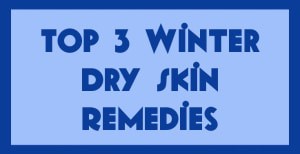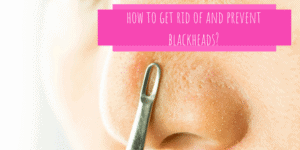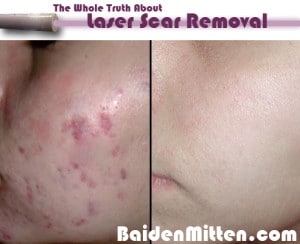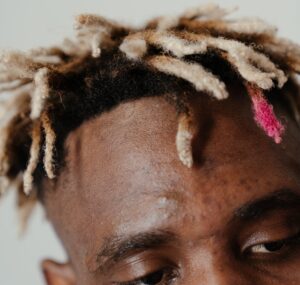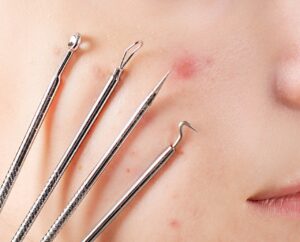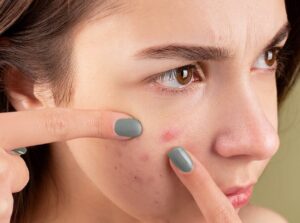Table of Contents
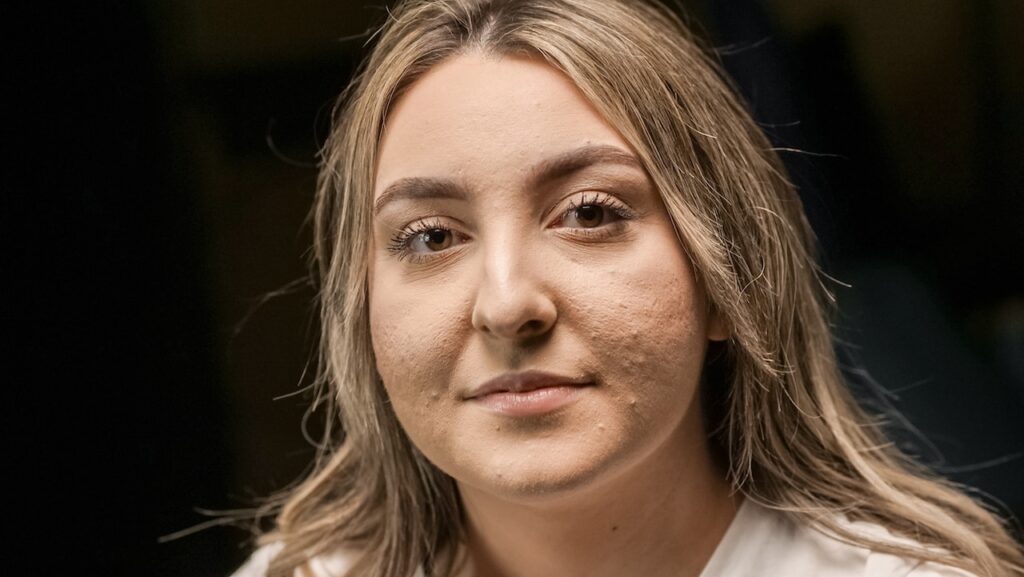
What is acne?
Acne is a common skin condition that affects millions of people worldwide.
Acne occurs when the oil glands in your skin become clogged and your sebaceous glands produce excess sebum, which then accumulates on the surface of your skin.
This can cause pimples or blackheads to form, as well as red bumps called papules.
Who Gets Acne?
The exact reason why some people get acne while others don’t is not fully understood.
However, research suggests that family history plays a role.
For example, if one parent has acne, their children have a higher chance of developing the same problem.
Of course, since families tend to follow similar diets and lifestyles, the possibility of the condition could be passed down the generations, not just by genetics but also by lifestyle.
Factors which can bring on this common condition or make acne worse than it needs to be include diet, stress, hormone levels and even certain medications.
Hormonal imbalances most often cause teenage acne as well as adult acne, which tends to occur in women around menopause.
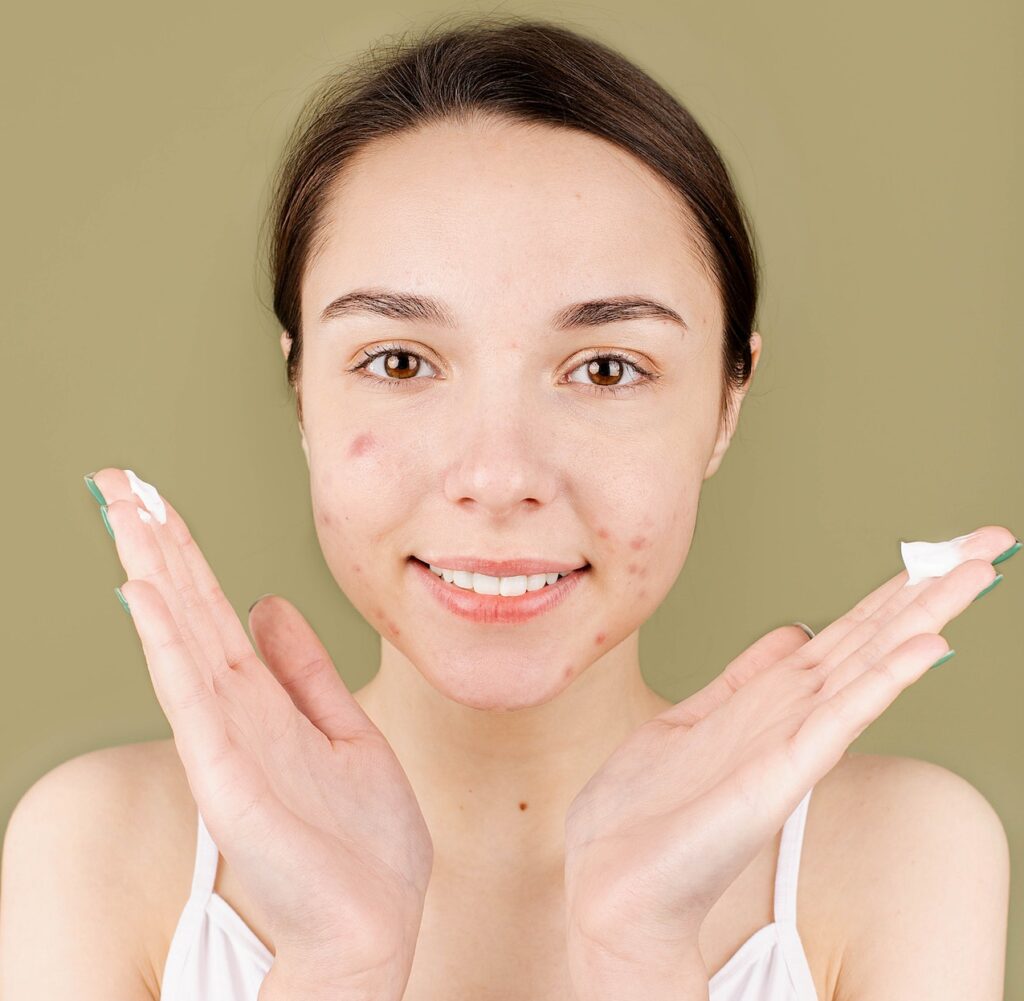
What are the different forms of acne?
There are many types of acne, including:
• Acne vulgaris (also known as “common acne”) – this type of acne usually starts around puberty and is most likely to affect women. It causes whiteheads, blackheads and pustules.
• Pityriasis rosea – this is an itchy rash caused by increased levels of hormones during pregnancy. The rash tends to be worse at night and improves with exposure to sunlight.
• Rosacea – this is a chronic disease characterised by facial flushing, redness and swelling. There may also be small blood vessels visible under the skin.
• Seborrhoeic dermatitis – this is a common skin condition affecting areas such as the scalp, face, chest and back. It is often associated with dandruff.
• Acne conglobata – this is a rare form of acne where there is a lumpy appearance to the skin.
Causes of Acne
While there are many possible causes for acne, the main culprits are thought to be:
• Too much oil produced by the sebaceous glands in your body.
• Hormone changes during puberty.
• Certain foods and drinks.
• Stress.
• Medications.
Symptoms and Causes
If you suffer from acne, you may notice any combination of these symptoms:
• Redness
• Bumps or lumps
• Whiteheads
• Blackheads
• Cracks or scars
• Pain
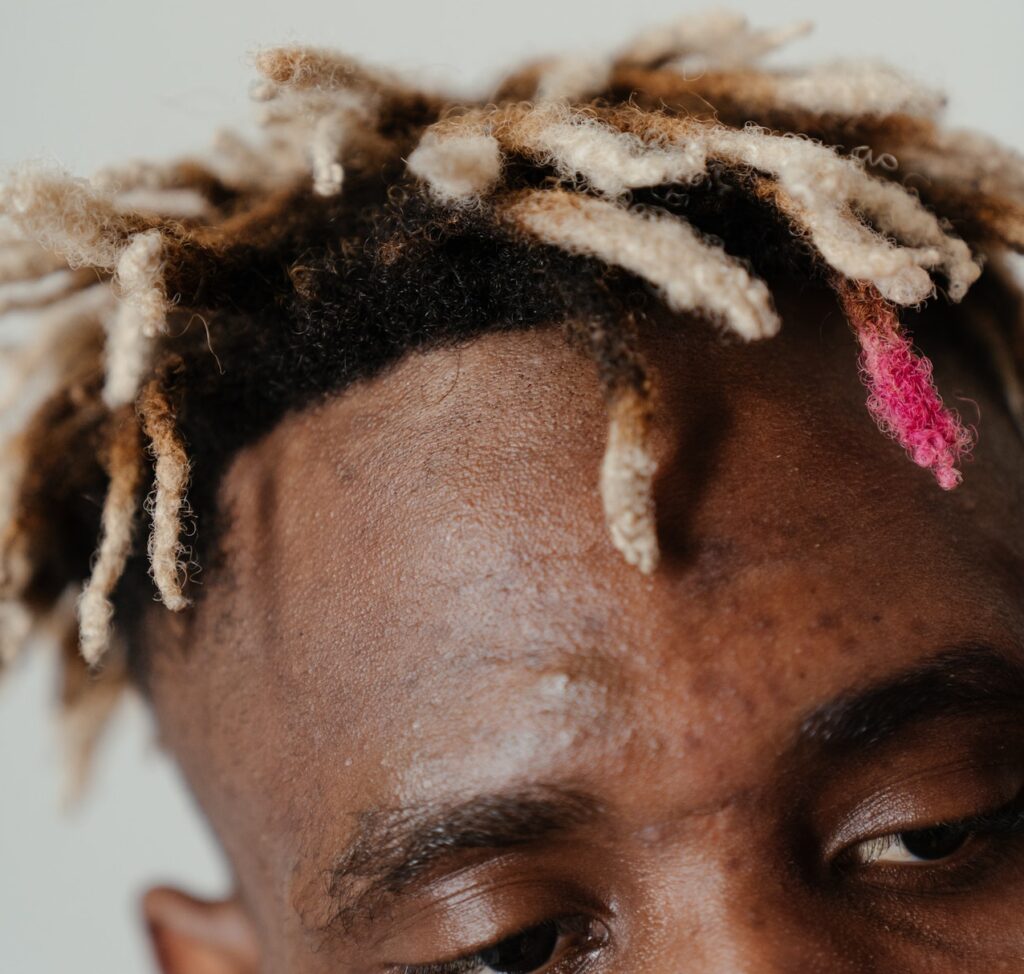
Where does acne most commonly occur?
Most cases of acne occur on the face, but other parts of the body can be affected too. In fact, about 80% of all cases of acne occur on just three areas of the body:
• Chin
• Forehead
• T-zone area between nose and mouth
Does chocolate cause acne?
No, it does not. Chocolate is a very healthy food and has many health benefits.
It contains antioxidants that help to fight free radicals in the body.
Free radicals are harmful chemicals that can damage cells and lead to skin problems such as acne.
That said, most chocolate contains sugar and dairy. If you can get dark chocolate without those – enjoy!
Why do so many teenagers get acne?
While many teenagers will get mild or moderate acne, some might finish with severe acne.
During puberty the risk factor for skin conditions amplifies due to hormonal changes and development of acne will come around due to skin producing a lot more oil.
Pores on your face or hair follicles become clogged with oil or dead skin cells.
This causes an overgrowth of bacteria in the pore which leads to inflammation and swelling.
The result is redness, bumps, pimples, blackheads, whiteheads and even cystic acne.
Proper hygiene and working with the body to cultivate beneficial gut bacteria can make a world of difference.

Do certain foods cause acne?
No, but some foods can provide aggravating factors to the problem.
Some of the most common culprits are dairy products, certain fats, drinks containing coffeine and sugar.
Dairy products contain hormones and puss that may increase oil production in your skin.
Sugar feeds bacteria that produce more sebum (oil) than normal.
It also causes inflammation which leads to pores clogged by dead skin cells.
Can acne cause scars?
Yes, it can.
Acne causes inflammation and redness on your face and sometimes even in other parts of your body.
This inflammation may lead to acne scarring especially if you suffer from severe acne.
Acne scars occurs when the skin heals too quickly or not at all.
The result is a raised bump, that generally can get better with time however, some acne lesions may lead to permanent scarring.
Mild Acne
Mild acne is the most common form of acne and can be treated with over-the-counter topical therapies acne treatments such as benzoyl peroxide, salicylic acid or topical retinoids.
If you have mild acne, your skin may look red, swollen, tender, or scaly.
You may also notice a whiteheads (a small pimples) on skin surface that has not yet broken open.
Please refrain from popping them
Moderate Acne
Moderate acne is a common skin disease that can still be treated with the right combination of products as in the case of mild acne but also with topical antibiotics and lifestyle changes.
Generally, when treating moderate acne remember that you might not need prescription medication, but it is the right time to take action to alleviate discomfort and stop it interfering with your confidence.
There are many home remedies that are available which can help you with the treatment of acne without causing any side effects as medical treatments such as oral antibiotics could bring on.
It is always better to consider more natural treatment options before considering any heavy duty acne medications.
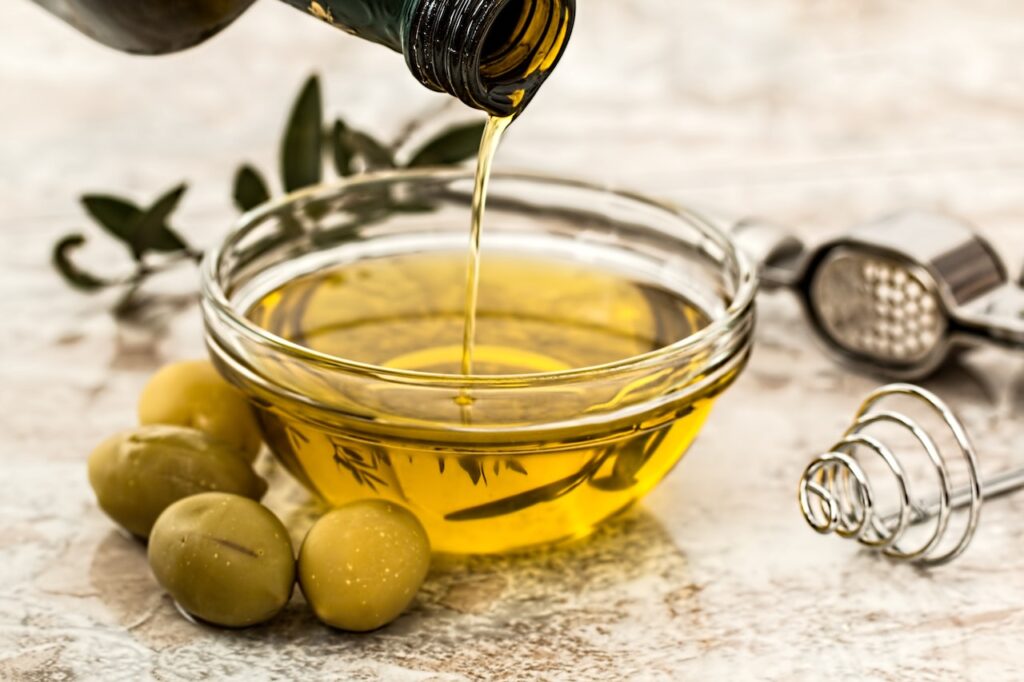
Acne home remedies
There are many ways to treat acne at home, and you can use anyone or a combination of these methods to cure your problem.
Some of the most effective treatments which people with acne have reported:
-Eliminating dairy from your diet. Dairy is very well known for aggravating acne, so it should be your first port of call. These days there are almost unlimited dairy alternatives, so it should not be too difficult.
-Eliminating sugar from your diet. Stop drinking sweet, fizzy drinks which make your body acidic and make acne bacteria thrive. Spring water, coconut water or kombucha will not only satisfy your thirst, but give you the necessary hydration, vitamins and minerals and improve your gut bacteria, so crucial for your overall health.
-Make sure you get enough sleep. Lack of sleep alleviates stress hormones in the body, making the whole body chemistry unbalanced and …. that is the environment which bad bacteria thrive in.
-The amount of fresh, raw fruit and vegetables in your diet. It is a lot easier than you might think. Green smoothie first thing in the morning will not only give you a really great clean out and detox daily, but also will make those good gut bacteria multiply like crazy. Basic smoothie consists of some fruit of your choice, a large dose of leafy greens or green powder, celery, cucumber and some avocado. Not only is it good for you but absolutely delicious!
If you want to speed up the process, you can use some home treatments for acne which work for all skin types including sensitive skin. The reason they work is that when you balance PH of skin surface, bad bacteria find it harder to survive:
1) Apple Cider Vinegar and honey mix: This is one of the best topical treatments for acne. It helps in reducing inflammation, killing bad bacteria and also reduces oil production.
Mix 1 tablespoon of apple cider vinegar with 2 tablespoons of RAW honey and apply it on your face. Leave for 1/2 hour and wipe off with damp cloth. Both good quality apple cider vinegar and raw honey have very strong anti-bacterial properties, so you will notice results within few days.
2) Aloe Vera Gel: Apply aloe vera gel directly on your affected area. Leave it overnight and wash it off next morning. Repeat this process three times a week.
3) Baking Soda: Use baking soda mixed with water to cleanse your face. Another super effective anti- bacterial treatment.
4) Tea Tree Oil: Mix tea tree oil with olive oil and apply it on your acne-prone areas. Let it dry and then wipe off with a damp cloth.
5) Coconut Oil: Massage coconut oil into your affected areas.
6) Rose Water: Mix rose water with some almond oil and apply it on the affected areas.
7) Green Tea: Mix green tea with honey and apply it on your skin
8) Egg Whites: Mix egg whites with olive oil and apply them to your skin.
9) Papaya: Mix papaya pulp with honey and apply it all over your face.

Preventing acne
– There are certain things that can prevent acne from occurring. These include using mild soaps and not washing your face too often to prevent surface of skin dehydrating. Removing makeup however is super important as leaving it on overnight will surely block the skin pores and cause more outbreaks. If you can avoid wearing makeup all together, it would give the best chance for your skin to heal.
– Proper exfoliation is crucial for removing dead skin cells from pores and hair follicles. Baiden Mitten is well known for assisting people of all ages with keeping their skin healthy and free of any dirt or dead skin buildup.
– If your skin is oily, avoid excessive touching. Use a tissue to blot off the access oil instead.
– Use gentle cleansers. Try to avoid soap to wash your face, proper face cleansers will do a much better job.
– Moisturizers are mandatory for the health of your skin, even if you already have an oily skin. They add moisture to your skin helping your skin soft and supple. It also prevents your skin from drying out on the surface
– Don’t squeeze, pop or pick at pimples.Those actions are the most common causes of spreading acne as they push bacteria deeper into your skin also causing tiny wounds which can get easily infected.
– Some sun exposure, which avoids harsh midday sun is beneficial as are far and near infrared treatments. Infrared lamps are inexpensive and readily available and will give you results very fast.
Controlling acne is absolutely doable if you are able to be proactive. Too many people are looking for a magic potion that will instantly heal them, but scores of people already found that truly healing themselves from any condition, including acne involves healing body as a whole. Your body wants to heal at all times, you just need to provide the right conditions for it to do so.
 SHIPPING WORLDWIDE
SHIPPING WORLDWIDE
